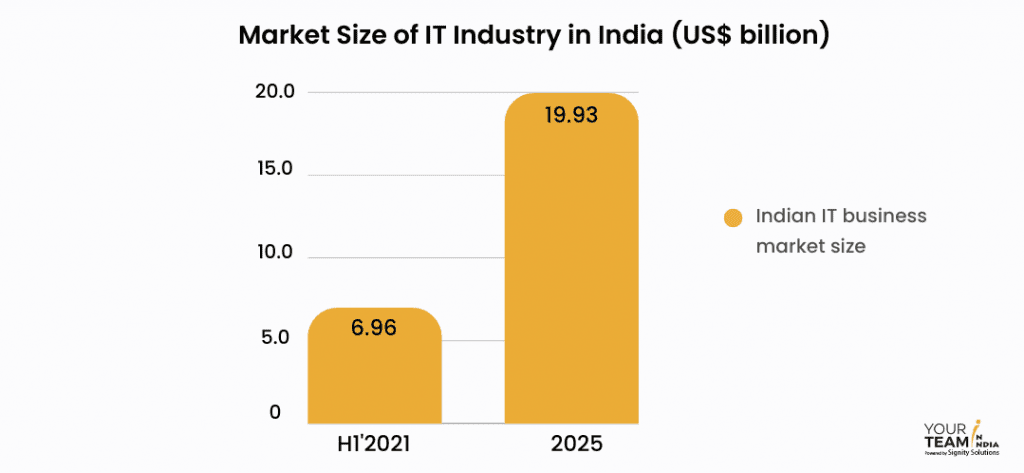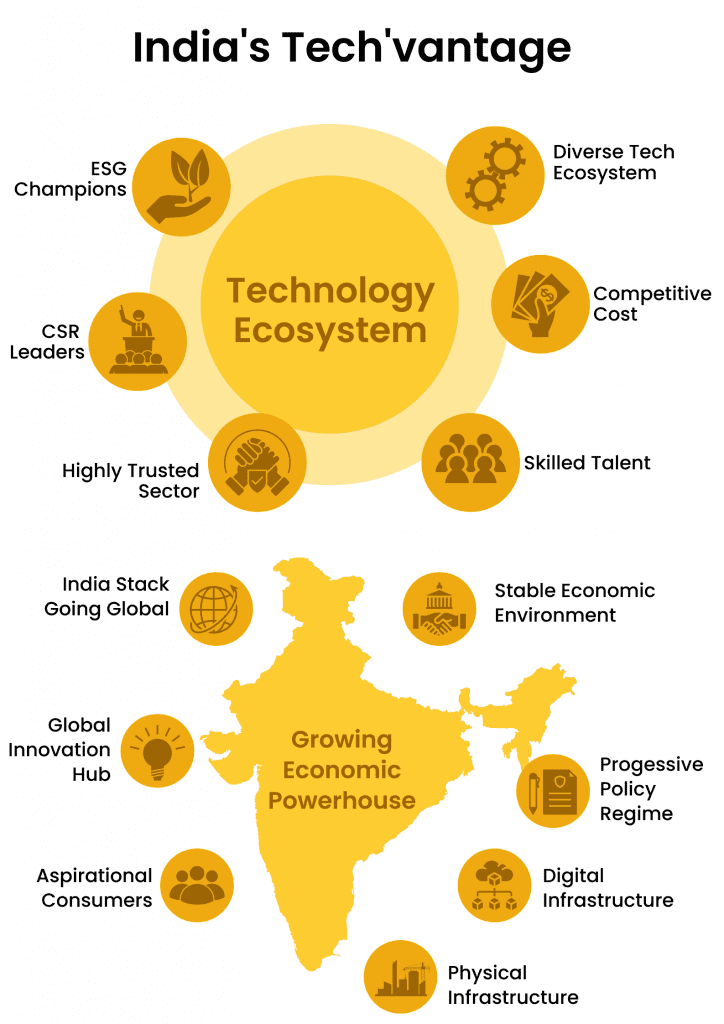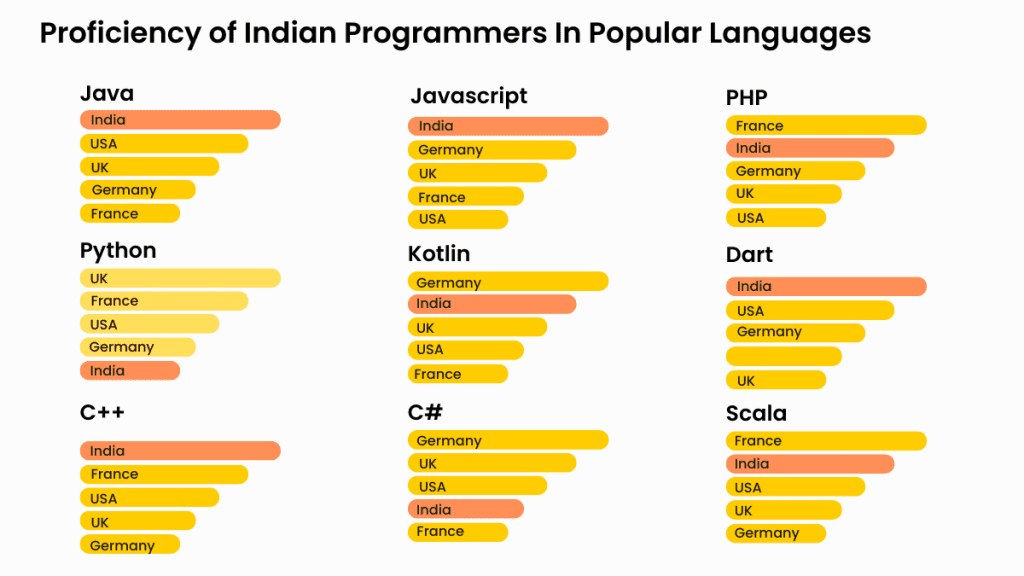Quick Summary: Indian programmers are the top hires due to their strong technical skills, cost-effectiveness, and adaptability. With expertise in the latest technologies and robust educational backgrounds, they excel in diverse team environments, providing businesses with a strategic advantage in the competitive tech landscape. This blog explores the key reasons why hiring Indian programmers can be a strategic advantage for your business
The VPs, CTOs, and other technical leaders often look for ways to find the right tech talent to fulfill their project requirements. In such a scenario, they either hire programmers locally or try to extend their software development teams abroad to obtain the best fit for the project requirements.
India has emerged as a leading destination for outsourcing software developers who consistently deliver high-quality outcomes. It has been at the forefront of IT outsourcing owing to its massive digital infrastructure and a large and skilled pool of Indian programmers.
Businesses worldwide today trust Indian programmers for outsourcing, and this trust has fueled the constant upward growth in the IT service market, making India a go-to destination to hire dedicated developers.
Key Takeaways
- India's IT industry has shown resilience in the global slowdown.
- India's skilled programmers, cost-effectiveness, and 24/7 support make it a top choice for IT outsourcing.
- India is leveraging technology to drive progress and innovation, as exemplified by its "Digital India" initiative.
India's IT market: What the future holds?
1. The latest NASSCOM Strategic Review indicates India’s technology industry revenue (including hardware) is estimated at $282.6B in FY2025, up from $268.8B in FY2024, with the sector on track to cross $300B by FY2026
2. India hosts 1,750+ GCCs, with GCCs and Engineering R&D identified as key growth hotspots driving value and product engineering for global enterprises in 2024–2025.
3. Domestic tech revenue is growing faster than exports for the second consecutive year, with 7% YoY domestic growth and increasing AI-led digital spend projected by CXOs for CY2025.

Developer population in India
The nasscom report shows today, India homes a total of 5.4 million Indian developers and has overtaken the USA, which sits at 4.4 million programmers.
"In the no-normal environment that we are living in today, the industry focus continues to be on investing for growth. Propelled by forward-looking policies, strong governance, talent, and digital trust to ensure accessibility, privacy, security, and reliability, the Tech Industry in India is on track to accelerate growth to $500 bn by 2030.”
President, nasscom
Major IT hubs in India
Where do you outsource software development in India? Here are the top IT hub cities of India for hiring software developers worldwide.
- Bengaluru: Known as the "Silicon Valley of India, Bengaluru remains the foremost IT hub of the country. It is home to over 1.5 million IT employees and boasts a thriving startup community, top-notch educational institutions, and a robust infrastructure.
- Hyderabad: Hyderabad's IT industry is booming owing to its government support and ideal business conditions. The city has several IT parks and R&D institutes, making it a top destination for companies hiring skilled and dedicated developers in innovative fields like AI and blockchain.
Hyderabad ranks in the top 10 destinations to hire programmers worldwide.
- Pune: Also known as the Oxford of East, Pune is one of the biggest education hubs in India, with nine universities and over 100 educational institutions. Pune boasts some of the largest IT parks and is home to 3200 businesses, which account for 2% of all IT startups in the country.
- Chennai: Chennai is a great place to find young, highly-skilled talent fluent in English. The city produces over around 35,000, specializing in IT. It ranks 12 in the top 20 global destinations for hiring experienced developers and offers several advantages, including good connectivity, available land, and a lower attrition rate (7-13%) than other cities.
- Gurugram: According to CBRE, Gurugram ranks as one of the top five IT hubs in the Asia Pacific region. It boasts convenient access to office spaces and a thriving business climate. Gurgaon is a well-known hub for IT outsourcing due to its proximity to Delhi-NCR, which provides access to a talented pool of skilled professionals.
- Mumbai: Mumbai is an ideal location to hire developers as it boasts favorable government policies, skilled IT resources, and excellent infrastructure facilities.
It is India's financial capital and offers exceptional services in app development services, software solutions, BPO services, healthcare and finance, and accounting. It is home to numerous IT companies like TCS, IBM, Mphasis, I–flex, Morgan Stanley, Citigroup Infosys, Wipro, HCL, and Mahindra Satyam.
- Chandigarh: IT companies such as TCS and Infosys are drawn to India's Chandigarh region because of its excellent infrastructure and abundant skilled and English-speaking Indian programmers. Mohali and Panchkula are quickly becoming hotspots for the IT industry, with STPI constructing a substantial incubation center in Mohali.
- Coimbatore: Coimbatore is conveniently located near Bangalore and Chennai and is being developed by the Tamil Nadu government as an outsourcing destination. It offers a strong engineering base and a large pool of skilled IT resources. As a Tier-2 city, it is a popular IT hub due to its high-quality resources, supportive government policies, and low attrition rates.
Ready to scale your tech team?
Partner with Your Team in India to easily scale your development team up or down to meet ever-changing software industry demands with top Indian programmers.
Why is India considered one of the best IT outsourcing destinations?
1. The abundance of skilled talent pool
Today, India is estimated to have 5.8 million software developers, making it the second-largest national software developer pool after China. But it is not by the sheer number that Indian coders outrank the world.
As per the nasscom report, with a 36% digitally skilled workforce, the Indian IT industry ranks top in AI skills penetration, offers the 2nd largest AI/ML BDA talent pool globally, and stands 3rd globally in the installed supply of Cloud professionals.
2. Low cost of living & hourly rates
Compared to its Western counterparts, hiring programmers from India costs you almost half the cost of a developed nation.
Take a look at the cost comparison.
| Average Hourly Rate | USA | Canada | Western Europe | Eastern Europe | India |
| Software Programmer | $36-$43 | $36- $52 | $68-$99 | $25-$49 | $18- $25 |
| Mobile App Developer | $35-$60 | $49-$97 | $40- $60 | $30- $50 | $18- $39 |
| Web Developer | $28-$39 | $30-$41 | $42- $53 | $25- $50 | $16- $30 |
| RPA Developer | $38-$47 | $27- $50 | $30- $75 | $30- $75 | $20- $40 |
| Cloud Computing & Tech Migration | $49-$57 | $30- $46 | $70- $149 | $36- $96 | $18- $35 |
3. Geopolitical stability
India has remained resilient amidst global challenges. It is currently the fastest-growing large economy globally. Indian GDP touched the 3.7 trillion mark, making India the 5th largest economy in the world, surpassing the UK ($ 3,159 billion), France ($ 2,924 billion), Canada ($ 2,089 billion), Russia ($ 1,840 billion), and Australia ($ 1,550 billion) at current prices.
The latest data from Economist Intelligence Unit Business Environment Rankings (EIU BERs)has ranked India 10th amongst 82 countries for ‘ease of doing business.’
Whether economic growth or strategic partnership, India is leading its way to become the Next Superpower.
4. Infrastructural capacity
India has a rapidly growing economy, and advanced infrastructure utilizes cutting-edge technology across all sectors. Currently, 63 STPI (Software Technology Parks of India) and 1500 GCCs (Global Capability Centres) are located in India. Many of its cities have access to the latest equipment, software, and 5G high-speed internet, which ensures continuous client support and communication.
5. Government support
The Indian government has strategically built India as one of the best IT outsourcing destinations.
- In the Union Budget 2023-24, IT and telecom sector allocation stood at Rs. 97,579.05 crore (US$ 11.77 billion).
- The government introduced the STP Scheme, which is a 100% export-oriented scheme for the development and export of computer software, including the export of professional services.
- In August 2022, the Indian Computer Emergency Response Team (CERT-In), in collaboration with the Cyber Security Agency of Singapore (CSA), teamed up for a successful cyber security exercise called "Synergy" in August 2022. It focused on increasing network resilience against ransomware attacks and involved 13 countries.
- India Government has also approved 22 new STPI centers across the country.
Like these, there have been multiple initiatives by the Indian Government to put India's IT sector at the forefront of technology evolution.
In fact, ‘hire Indian developers is one of the most popular terms searched on the Internet today in the context of outsourcing or offshore software development. But the real question is what makes Indian programmers the best in the world. So, without further ado, let’s discuss it.

7 Reasons why Indian programmers are good at programming?
Now that we understand why companies prefer to outsource their software development in India. Let us examine why you should choose Indian programmer and how they outrank their peers.
Here’s the list of intellects that urges businesses around the globe to work with Indian programmers:
1. Best quality providers in the world
India, on average, adds 1.5 million computer science graduates to its IT population every year. Indian programmers are cost-effective and offer the best quality work.
Indian programmers outperform US counterparts in math and logic, according to a study by Gild that examined data from 1 million tests taken by 500,000 developers.
Indian programmers excel in STEM education, with degrees in computer science and related fields. They have a strong work ethic and quickly adapt to new technologies.
India is in the top position for providing custom software development solutions. With the highest number of ISO-certified companies, India has always focused on quality services and on-time delivery.
The common process followed by Indian Software Developers uses to ensure quality work.
- Having requirement analysis
- Design and wireframing
- Coding and Development
- Prototyping and testing
- Quality Assurance
Lastly, the process goes through bug fixing and testing before the project is given to the client.

2. There’s no language barrier
Since India is the second largest English-speaking country in the world after the USA, there is no language barrier for Indian programmers.
Top Indian engineers have strong English language skills, which allow them to collaborate effectively with international businesses. According to the World Population Review’s report for 2025, India has a higher level of English proficiency than other countries with large engineering populations.
Besides being good at spoken English, Indian programmers are also known to have great analytical skills, which makes them apt to hire for complex projects. So if you are looking to hire the best remote software developers with no geographical or cultural challenges, & excellent communication skills, India is for you—adoption rate as per the client’s needs.
3. Around-the-clock services
When you work with Indian programmers, you enjoy the benefit of around-the-clock development. The time-zone difference between India and the USA is approximately 9 hours, which means when Indian programmers have submitted the work for the day & logged out, your in-house employees are getting to work.
They can review the submitted task and share feedback and changes. So, when your Indian dedicated development team logs in, they already have work aligned with them for the day.
This zero lag in feedback helps boost productivity and also ensures that there are quality and on-time deliverables. Comparing Indian time zones with the USA and European countries, which face difficulty in tackling time differences due to there being only a few hours difference, Indian programmers are easy to communicate with and work with.
Having an in-house team and an offshore software development team creates availability for your clients around the clock. This adds to your business goodwill and encourages customer loyalty towards your brand.
4. Indian programmers work globally
Most Indian tech companies follow Western business models and culture. They are eager to resolve development issues, bring innovations, and get involved in the firm's success.
Developers don’t need to follow a strict hierarchy and have a certain sense of freedom. Information access has brought a global mindset to the coming startup companies and entrepreneurs.
5. Best attitude at work
Indian programmers are empaths with great people skills. Unlike their Western counterparts, Indian developers don’t hesitate to extend their support beyond their working hours for the projects they are working on.
Being raised in an ‘Atithi Devo Bhava culture,’ which translates to ‘Guests are like Gods and must be treated the same way,’ Indian developers are always respectful, kind, and humble.
6. Indian programmers have technical knowledge
Indian developers are educated and possess high technical knowledge & great programming experience. Their technical understanding helps them to build amazing software solutions for transforming the business digitally.
India is leading the way in utilizing cutting-edge technologies such as AI, ML, Robotics, Blockchain, and cloud computing to develop inventive solutions. It has the potential to become the world's robotics and AI hub, with a hybrid workforce of as many robots as engineers to serve clients round-the-clock.
Being technically strong, developers across India readily take on new challenges.
7. Indian developers offer client satisfaction
Indian developers offer the best services to their clients as the offshore companies in India aim to satisfy the global clientele regardless of the type of their business and project size.
India developers provide client-centric solutions while keeping quality standards high with the help of various tools.
It is a golden opportunity for the corporate to cash on the scenario anytime by getting the value for money. For reference, more than 75% of the world’s CMM Level 5 certified companies are based in India.
Explore: Why IT Outsourcing in India is the Best Decision in 2025
Empower your business by hiring top Indian developers.
Maximize your development efficiency and drive innovation with Indian programmer's cutting-edge skills and dedication.
Things to consider when hiring software developers from India
Access to a large talent pool comes at a cost. The bigger the pool of Indian developers, the harder it is to find the best programmers in India. To simplify this process, I am listing the key factors you should consider while hiring a software developer in India.
1. Key technologies & languages
Evaluation of technical and linguistic abilities is essential when hiring Indian software developers. The process includes evaluating their proficiency in various tech stacks, frameworks, and popular coding languages.
Given its ever-changing landscape, selecting Indian developers with up-to-date skills and knowledge is paramount in the software engineering industry.
2. Skills & competencies
Defining specific abilities and competencies is crucial in properly evaluating a programmer's language skills and code quality.
Proficiency in a programming language involves the ability to write high-quality code. This skill allows individuals to produce clean or improve existing code for simplicity, accuracy, and modularity.
Code quality means creating secure, modular, and easy-to-maintain code. It should also follow best practices and be reusable for new programs and applications. Evaluation of these two skills will help you hire programmers in India that fit your project requirements.
3. Education & work experience
Education provides a good base when hiring programmers from India. It gives you insight into a developer's knowledge and expertise. However, experience has far more value in software development due to the ever-changing technology landscape.
According to a Stack Overflow study, approximately 75% of developers worldwide possess a bachelor's degree or higher. In contrast, 87% of developers have independently learned a programming language, framework, or tool without formal classroom instruction or coursework.
That's why you should prioritize work experience and coders' constant effort to upskill themselves while selecting Indian software developers for your project.
4. Real-world skills assessment
Technical skill assessment is necessary if you wish to hire coders in India. It clarifies whether the developer’s skillset claims match their capabilities. You can do this by conducting coding tests and system design interviews.
A coding test can help evaluate a programmer's skills in problem-solving, programming languages, and application tools. It helps you assess the accuracy of programmers coding skills on the go by live testing it.
A system design interview is ideal for senior resources and provides you insight into their project management capabilities. During these interviews, candidates discuss system-related topics such as scalability, storage, and reliability, sharing their thoughts and ideas.
Assessment of real-world skills through these two methods can help you find the best programmer in India.
5. Cultural Fitment
Assessing whether an Indian programmer fits well in your organization’s culture is one of the most important aspects of hiring developers. To gauge cultural fitment, you must evaluate their
- Communication skills
- Ability to work in a team
- Conflict resolution ability
- People skills
- Work ethics and methodology.
Considering their "culture fit" is crucial for a successful working relationship.
Comparison: Indian programmers Vs. American programmers
A constant comparison is made between developers in the USA and Indian programmers. Though both nations provide talented tech experts, they have advantages and limitations. Let's take a look into the same.
| Comparison Matrix | USA | INDIA |
| Number of resources | 4.4 million software developers. The USA has the 2nd largest population of software engineers. | India is leading the tech world with a population of 5.4 million software developers. |
| Education | USA developers, when compared to their Indian counterparts, lag in formal education. | A higher percentage of Indian developers have Bachelor’s degrees. |
| Skills | American programmers outperform Indian developers in mainstream programming languages like C, Java, and SQL. | Indian programmers are known for their strong math, logic, and analytical skills. Indian programmers are also good at problem-solving. |
| Tech Expertise | American programmers excel in web development, data science, game development, and security. Some of the most popular websites, video games, and leading companies in these fields were created by American programmers. The United States is a hub for innovation in these industries. | Indian programmers are leading the industry in emerging technologies like AI(artificial intelligence), ML(machine learning), Blockchain, and Bigdata. |
| Salaries | As per Glassdoor’s latest data, a software engineer in the USA makes more than $92,000/ annum. | Glassdoor’s latest data on salary comparison shows tha an Indian programmer makes about $ 9751/annum. |
| Adaptability | USA developers are less flexible in extending or changing their working hours. | Indian developers have a client-centric approach and are more flexible in extending or changing their operational hours. |
Though Indian developers make the perfect companion for building IT software solutions, not all have the same skillset and efficiency in delivering high-quality output.
Therefore, choosing the right source for hiring software developers in India is crucial.
Why to Work with Indian programmers from Your Team in India?
Your Team in India is a website development company that offers offshore development services to businesses worldwide. With 13+ years of extensive experience in software development, we have successfully delivered over 1000+ projects.
How Your Team in India helps you hire offshore developers?
- Based on your project requirements, we find the best programmers for your project from our pool of 200+ skilled individuals.
- Complementary DevOps support to set up your code versioning platform and CI/CD pipeline.
- We give you candidate profiles to review and communicate with. You can also interview them to assess their abilities and compatibility. Our team is committed to assisting you throughout the process with a dedicated relationship manager.
- Complete replacement policy for the hired resource in case the resource fails to satisfy your expectations.
- Using industry-grade firewalls, we set up completely private and isolated networks according to the client's security guidelines.
- Our replacement policy guarantees your complete satisfaction with the resources you choose. Suppose the selected resource fails to meet your expectations. In that case, we will replace them with equally good or better talent.
- We understand the importance of protecting your intellectual property, so we sign an NDA and contract to ensure its complete protection.
- One of our core values is mentorship and coaching. Our experienced tech experts guide you and your hired resources free of charge.
- Regular audits of the code quality through automated tools and procedures to ensure a scalable solution for you.
- We offer a 2-4 hour window of overlapping work hours for our overseas clients. It allows easy communication with our team regarding updates, work direction, or team meetings.
- We accommodate your request to install a tracking mechanism to ensure the project's progress. Also, we already have Hubstaff installed for internal monitoring of work progress.
- Resources will be available via Slack or any project management tool you suggest for communication.
So to sum it up, there are no two thoughts about Indian programmers being good at programming. India offers a great infrastructure, a large talent pool, geopolitical stability, and government support, making it a favorable destination for outsourcing IT projects. And Indian programmers are talented, diligent, and adaptable, making them a good first for your project.
But not all developers are the same, so you must carefully evaluate their skillsets, tech competencies, and cultural fitment before hiring them for your project.
A better alternative is to partner with a trusted offshore software development company like Your Team in India to hire the best programmers in India.

Frequently Asked Questions (FAQ's)
Hiring developers from India gives you a large pool of talented programmers across technologies at economical pricing. Besides, India also offers great infrastructure support and geopolitical stability to ensure your project is developed best IT environment.
India offers a STEM-based education system, making its programmer highly analytical individuals who are good at problem-solving. Besides, India is leading the way in all emerging technologies like AI, Blockchain, and Big Data.
The outlook for programming in India is promising. India has a rapidly expanding economy with a strong emphasis on IT development. The software product industry in India is projected to reach US$ 100 billion by 2025.
As per the latest Glassdoor data, an Indian programmer costs around $9751/annum.

Get Your FREE Guide to Unlock India’s Talent Potential
- Agile.
- Global
- Growth-driven





![11 Reasons Why IT Outsourcing in India is the Best Decision [2026]](https://www.yourteaminindia.com/hs-fs/hubfs/Imported_Blog_Media/Why-IT-Outsourcing-in-India-is-the-Best-Decision-Sep-25-2023-10-24-24-2770-AM.png?width=352&name=Why-IT-Outsourcing-in-India-is-the-Best-Decision-Sep-25-2023-10-24-24-2770-AM.png)
